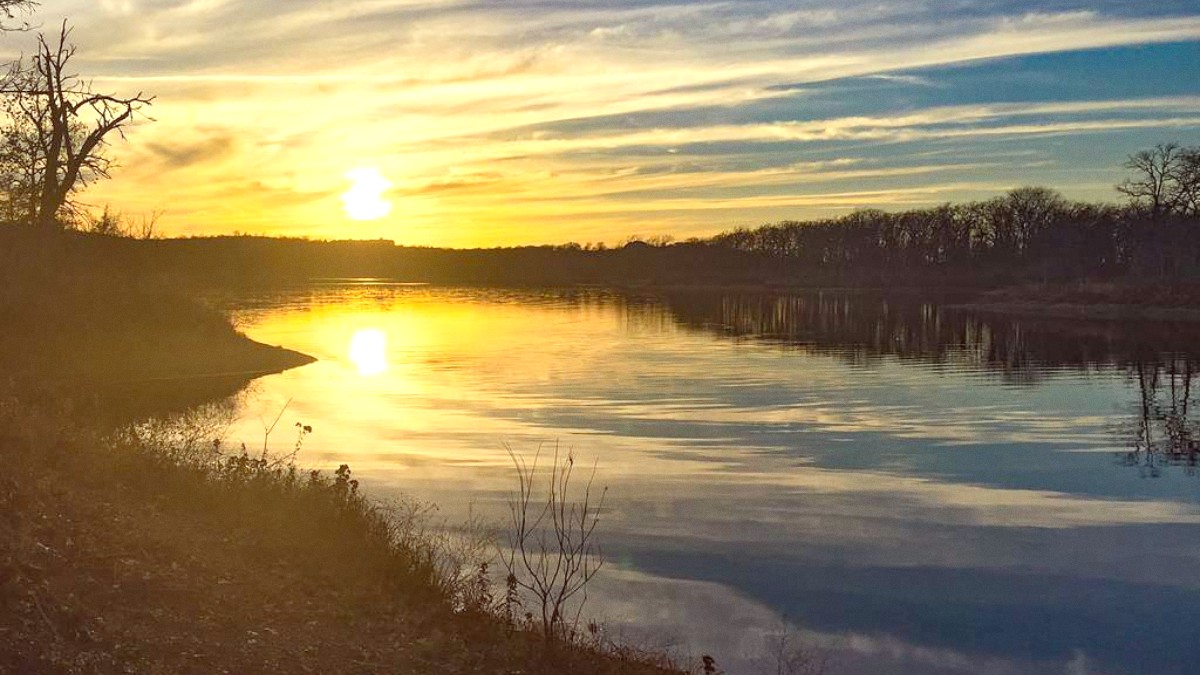
Oklahoma, USA
Chickasaw National Recreation Area experiences a humid subtropical climate, presenting four distinct seasons, each with unique appeal. Spring (March-May) temperatures typically range from 45°F to 75°F with considerable rainfall. Summer (June-August) brings hot and humid conditions, often exceeding 90°F. Fall (September-November) offers milder temperatures from 50°F to 80°F, with decreasing humidity and fall foliage. Winter (December-February) temperatures are cool to cold, typically in the 20s-50s°F, with occasional ice or snow.
Summer is the high season, ideal for water activities but with crowds and high temperatures. Shoulder seasons (spring and fall) bring pleasant temperatures for hiking and fewer crowds. Winter, the low season, offers peaceful solitude and unique scenery, but water activities are not an option.
Summer often brings prolonged periods of temperatures exceeding 100°F, increasing the risk of heat exhaustion and heatstroke. Take precautions by staying hydrated and seeking shade. Winters can feature freezing temperatures and occasional ice storms, making roads slippery.
Oklahoma sits in "Tornado Alley." Severe thunderstorms, including those producing tornadoes, are possible, especially in spring (March-May). Monitor weather forecasts closely. The park makes designated storm shelters available at some campgrounds. Heavy rainfall, especially in spring, can lead to flash floods in low-lying areas. Exercise caution around waterways during and after significant rain.
High risk of heat exhaustion.
Stay hydrated, wear light clothing, seek shade, limit strenuous activity.
Dizziness, nausea, headache, heavy sweating.
Tornado risk in spring.
Monitor forecasts, note storm shelters, know watch vs. Warning.
Take shelter immediately if a tornado warning is issued.
Heavy rain danger.
Avoid low-lying areas and flooded roads near creeks.
"Turn around, don't drown" when facing flooded areas.
Temperatures typically range from 45°F to 75°F. This season sees considerable rainfall, with April and May being the wettest months. Humidity is moderate to high.
This period brings hot and humid conditions. Daily high temperatures frequently exceed 90°F, often climbing to 100°F or higher. Nighttime lows are usually in the 70s°F. Thunderstorms are possible, but precipitation generally decreases after June. The park’s waters offer a welcome respite from the heat.
Milder temperatures (50-80°F), decreasing humidity, less precipitation. Fall foliage peaks late Oct-early Nov.
Cool to cold (20s-50s°F). Occasional ice or snow. Lower precipitation than spring. Quiet atmosphere.
All park facilities open, warm weather perfect for water activities, lush greenery.
Crowds, limited camping/lodging, high temperatures for hiking.
Fewer crowds, easier reservations, unique winter scenery, accessible trails.
No special permits are needed beyond standard U.S. Travel guidelines for entering Chickasaw National Recreation Area itself.
No visa needed. Present a valid government-issued identification, like a driver's license or passport, if requested for identification purposes. Entry into the park itself does not require ID.
Standard U.S. Visa requirements apply, based on your nationality and the purpose of your visit. Most international travelers visiting for tourism will either apply for a B-2 Tourist Visa or qualify for the Visa Waiver Program (VWP).
The main currency used is the United States Dollar (USD). Costs vary significantly based on your travel preferences. This provides an approximate daily breakdown, excluding the cost of travel to the region (flights, long-distance fuel).
The park's main currency is USD. Travelers will find various price points for accommodations, meals, and transportation. Smart strategies can help manage expenses.
Accommodations: NPS Campsites: $14-22/night. Motels/Budget Hotels (Sulphur/Davis): $70-120/night. Mid-range Hotels/Cabins/Vacation Rentals: $100-250/night.
Meals: Fast Food/Casual Eatery: $10-20/person/meal. Sit-down Restaurant: $20-40/person/meal. Groceries: $50-100 for a few days for two if cooking.
Utilize the park's well-maintained campgrounds for significant savings on accommodation. Reserve your campsite well in advance on Recreation.gov.
Cost-effective lodging.
Limited spontaneity without reservation.
Bring groceries and prepare meals at your campsite or lodging with kitchen facilities. This cuts down on dining expenses. A Portable cooler is very beneficial for storing perishables.
Significant food cost reduction.
Requires effort and planning for meals.
The park makes available numerous free activities. Enjoy hiking, swimming, picnicking, and wildlife viewing without any additional cost. Pack all needed gear and food from home.
Free entertainment and exploration.
Limits options to park-provided free activities.
| Service | General Expectation | Notes |
|---|---|---|
| Restaurants | 15-20% of the bill | For good table service, consider more for exceptional service. |
| Bartenders | $1-2 per drink or 15-20% tab | Applies to counter service as well. |
| Hotel Housekeeping | $2-5 per night | Leave on pillow or designated spot daily. |
Your health and safety remain of utmost importance during any trip. Chickasaw National Recreation Area is a generally safe destination, but preparing for common health concerns and understanding emergency procedures supports a secure visit.
Hydrate well, wear lightweight clothing, seek shade frequently. Limit strenuous activity during peak heat.
Use Insect repellent with DEET/picaridin. Treat clothing with Permethrin. Perform tick checks.
Apply broad-spectrum Sunscreen SPF 30+. Wear a Wide-brimmed hat and Sunglasses.
Required & Recommended Vaccinations:
No specific vaccinations are needed for entry. Review general U.S. Vaccination guidelines and ensure routine vaccinations are current (MMR, DTaP, Polio, Flu shot).
Potable water is accessible at visitor centers, campgrounds, and some day-use areas. This water is generally safe to drink. A Water filter bottle is beneficial as a backup.
Standard U.S. Food safety practices apply. Store perishables properly.
For all emergencies (police, fire, ambulance). State your location clearly.
Mercy Hospital Ardmore (30-40 min south), Mercy Hospital Ada (45-50 min northeast).
Limited facilities in Sulphur for non-life-threatening needs.
Oklahoma is part of "Tornado Alley," with a risk of tornadoes mainly during spring (March-May). Heavy rainfall can cause flash floods.
Chickasaw National Recreation Area is generally a safe place to visit. Most safety concerns relate to natural hazards. The surrounding towns of Sulphur and Davis are small communities with generally low crime rates.
Practice general safety precautions: secure valuables, lock vehicle, be aware of surroundings.
For unforeseen circumstances, consider trip cancellation, medical, and lost luggage coverage.
Comprehensive travel medical insurance is highly recommended due to high U.S. healthcare costs. Options from World Nomads, SafetyWing, or Insubuy.